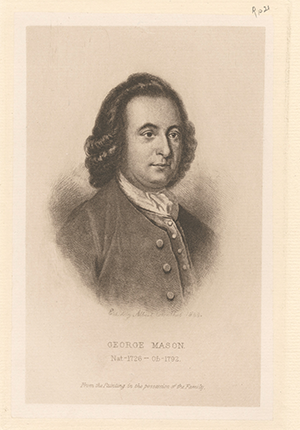Background
During the American Revolution, the Continental Congress called on the states to write new constitutions. Many of these state constitutions included their own Declarations of Rights. The most influential of these charters of freedom was the Virginia Declaration of Rights—authored primarily by George Mason. Adopted by the Virginia House of Delegates in June 1776, the Virginia Declaration of Rights was part of the Virginia Constitution. Later, Thomas Jefferson drew inspiration from the Virginia Declaration’s vision of natural rights when drafting the Declaration of Independence. State constitution-writers borrowed language from the Virginia Declaration when framing their own state constitutions, including this language on natural rights, social contract theory, and the freedom of conscience. And a little over a decade later, James Madison kept the Virginia Declaration by his side when crafting a Bill of Rights for the U.S. Constitution.








